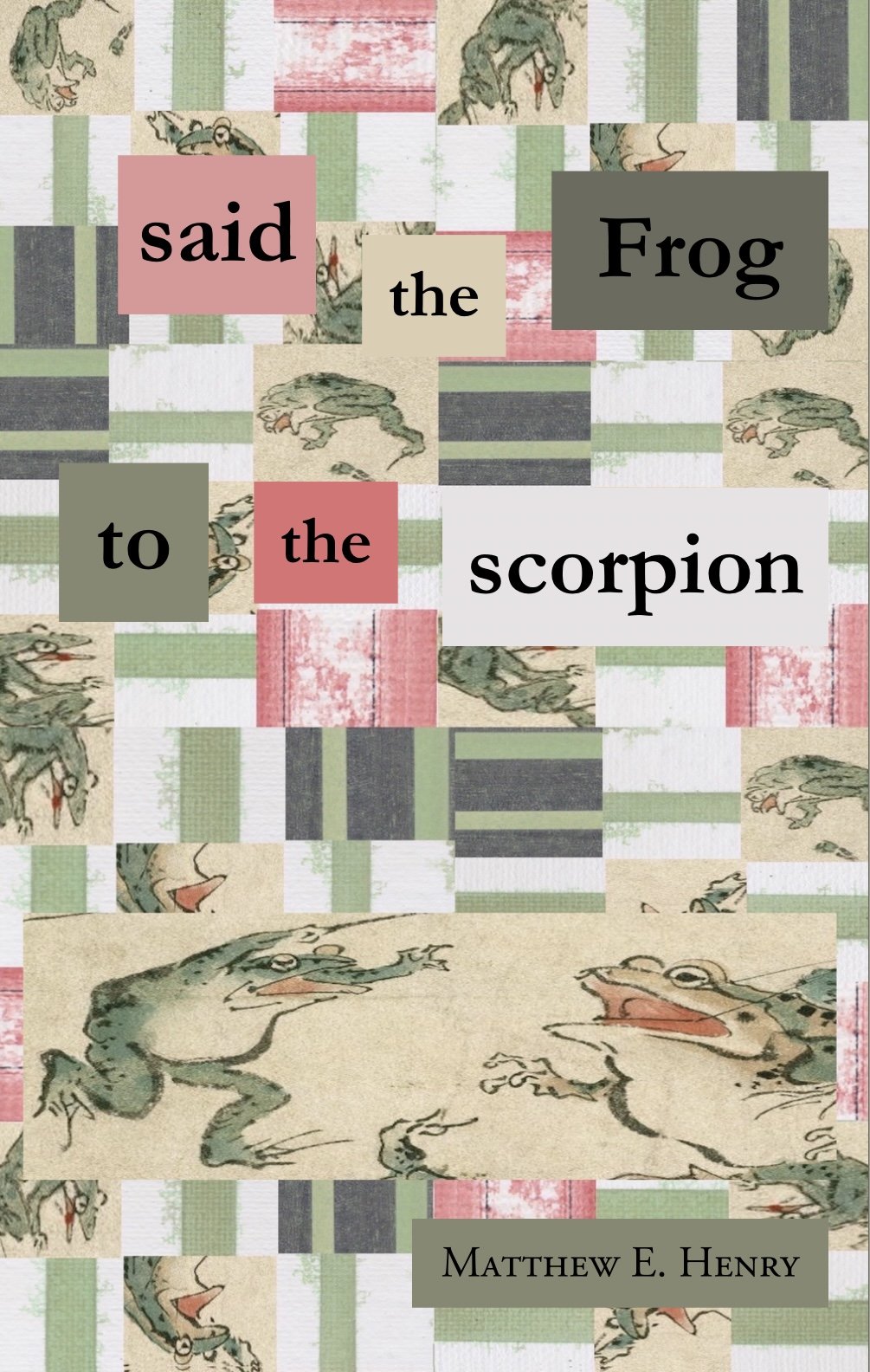From conversations in public school classrooms and faculty meetings, to arguments in restaurants and folding tents, said the Frog to the scorpion blurs the lines between pedagogy and prejudice, romance and anti-racism. In poems referencing a ubiquitous “She,” Matthew E Henry’s latest collection explores the options left a Black teacher in a white system when love is met with empty promises and toxic amnesia. Henry’s frog survives the initial encounter and slowly, painfully, “his slick, perforated back” begins to understand: a scorpion will always be exactly who She is—someone who can’t tell Asians students apart, who equates accountability with gaslighting, who thinks Goldilocks was the hero of the story, who makes wishes on the rubbed heads of magic negroes She’s dated. said the Frog to the scorpion attempts to decode Her mind, and the fallout of the relationship, while asking what’s the difference between a breakup and resignation letter.
Advance Praise for said the Frog to the scorpion
said the Frog to the scorpion by Mathew E. Henry, is the searing testimony of a Black public school teacher in a mostly white, American school. In it, the author confronts what is too often left unspoken: the unacknowledged damage caused by our failures as a nation and as individuals to dismantle systematic racism. Henry asks readers to think beyond deciding “whether blame can be laughed away / or buried” and instead, invites us to face ugly truths head on. said the Frog to the Scorpion takes brilliant, unexpected risks through reclaiming forms found in public schools: fairy tale retellings, pop quizzes, erasures, formative & summative assessments and a bingo board. In some poems, he also addresses a former lover, though we are unsure as we read, whether this person is a person or an institution. These are poems that challenge us to build a new world from the bars of broken cages, to insist on more than how “we hold to whatever keeps us going until / something better comes along, and then / we hold on to that.” Ultimately, Henry inspires us to examine our own complicity and the damage we have experienced, demands that we become willing to do what is necessary to effect true change, and to know “what you will say— / what you will do—when the time comes, / compared to what you are doing right now.” This collection is necessary for everyone who has taught or attended school in America, for everyone who thinks they are not racist, and for anyone brave enough to be part of the solution.
—Joan Kwon Glass, author of Night Swim
Like the smooth skin that grows back beneath a scab, the poems in said the Frog to the scorpion are both scarring and tender. Formally dextrous and sharp-witted, Henry’s poems confront issues of race and loneliness both within systems and the self. Here a poem alluding to Frost’s “Mending Wall” becomes a scathing indictment of the prejudices of a McMansion-strewn suburb. Here, the Dukes of Hazard and Goldilocks teach important lessons about what “harm” can mean. Here, despite the exhaustion of being treated as “a lawn jockey, a comfortable token, prominently placed,” there is hope for something better, a safe crossing to a sweeter shore.
—Donna Vorreyer, author of To Everything There Is.
Matthew E. Henry’s said the Frog to the scorpion is a haunting reflection on social isolation as a black teacher in a predominately white school. The misunderstandings that infiltrate this collection emphasize the jarring duality of Henry’s lived experience. “you’re not real. not a ghost / of someone who once was” serves to highlight the difference that penetrates this collection with the cold reality intertwined with a loving endearment unique and warming. To summarize, this chapbook presents an apt and rousing narrative that pays homage to racial difference and the teaching profession without surrendering oneself to any preconceived notions of either. A definite must read.
—A.R. Salandy, Editor in Chief Fahmidan Journal and Publishing & Co, Author Half Bred & The Sands of Change
